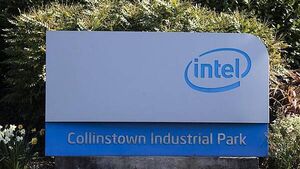Intel shares fall as weak outlook overshadows new CEO’s turnaround promises

Reuters
Intel shares fell nearly 6 per cent in premarket trade on Friday after the chipmaker's weak revenue and profit forecast disappointed investors hoping for reassurances from new chief executive Lip-Bu Tan's turnaround strategy.
Once a dominant force in the chip industry, Intel is struggling to catch up with rivals after years of missteps, battling to gain ground in AI while its largest market, China, remains locked in a trade war with the US.
The company is also a major employer and investor in Ireland, with more than 4,900 staff at its Leixlip plant, which includes its new Fab 34 chipmaking facility.
Minister for Enterprise Peter Burke said he was continuing to engage with Intel in what he called a difficult time for staff in the midst of continued uncertainty.
Mr Burke said in a statement on Friday: "I note the publication of Intel’s Q1 financial results last night and comments from CEO Lip Bu Tan that they were ‘a step in the right direction’, while also confirming there will be a reduction in Intel’s workforce globally.
"While no specifics around the number or location of job cuts were flagged, the company have said they plan to reduce operating costs by $500m this year and $1 billion next year, and stated this will include a reduction in the workforce, particularly in management and non-core engineering roles. It is likely to be several weeks before detail is available on the impact of these cost reduction measures."
Mr Burke said it was positive that Intel said it would continue to focus investment on their core business, the manufacturing of semiconductor products, which is the primary activity in Ireland.
Investors and analysts, who are counting on Tan — appointed CEO last month — to drive a turnaround, were left disappointed by the company’s weak financial forecast despite his signals of cultural change and renewed focus on core engineering.
"The clearest sense from the CEO transition is that this is going to take time," Morgan Stanley analysts said. The California-based company said it expects revenue of $11.2 billion to $12.4 billion for the June quarter, compared with analysts' average estimate of $12.82 billion, according to data compiled by LSEG.
Despite chips being exempted from US president Donald Trump's tariffs for now, a major hit to Intel could come from China's retaliatory tariffs on US imports, with chips manufactured in the US set to face levies of 85 per cent or higher, based on the state-backed China Semiconductor Industry Association's (CSIA) notice earlier in April.
Amid Tan's attempts to streamline the company and cut costs, Intel also said it is reducing its adjusted operating expense target to approximately $17 billion in 2025, down from its previously stated goal of $17.5 billion, and is now targeting $16 billion in 2026.
Tan said Intel is examining its factory footprint. In February, the company said it was pushing back a $28 billion factory project in Ohio until 2030.
"We will continue to take a closer look at our existing factory footprint to ensure that we are making the most efficient use of our in-store capacity before committing to any additional spending," Tan said on Thursday.
Tariff-led volatility had pushed customers to stockpile Intel chips, boosting sales for the first quarter but weighing on the second, CFO David Zinsner said.
Intel has gained 7.2 per cent so far this year, outperforming AI chip leader Nvidia and Advanced Micro Devices, which have each fallen nearly 20 per cent.
Nvidia and Advanced Micro Devices are yet to report results.




